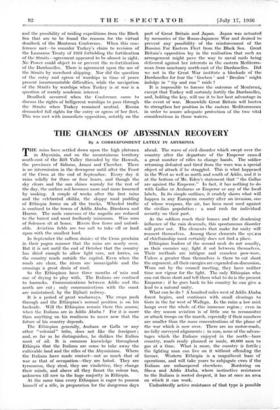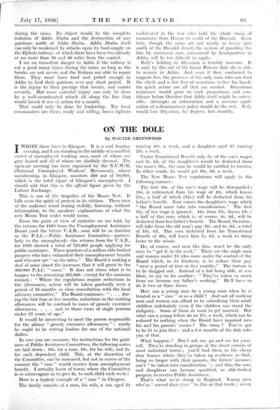THE CHANCES OF ABYSSINIAN RECOVERY
By A CORRESPONDENT LATELY IN ABYSSINIA
THE rains have settled down upon the high plateaux in Abyssinia, and on the mountainous territory south-east of the Rift Valley threaded by the Hawash, the provinces of Sidamo, Arussi and Chercher. There is no intermission in the downpour until after the Feast of the Cross at the end of September. Every day it rains solidly for three or four hours, and though the sky clears and the sun shines warmly for the rest of the day, the surface soil becomes' more and more loosened by soaking. A couple of weeks after the first rains and the • celebrated chikka, the sloppy mud pudding of Ethiopia forms on all the tracks. Wheeled traffic is Confined to the towns of Addis Ababa, Diredawa and Harrgir. The`mule caravans of the nagadis are reduced to the barest and most foolhardy minimum. Wise sons of Solomon sit at home. Rivers flow fierce and unford- able. Aviation fields are too soft to take off or land upon with the smallest load.
In September the saffron daisies of the Cross proclaim in their pagan manner that the rains are nearly over, But it is not until the end of October that the country has dried enough to allow light 'cars, not lorries, on the country roads outside the capital. Even when the roads are clear, the rivers are unnavigable and the crossings 'a great drain of mud.
So the Ethiopians have three months of 'rain and one of drying to play with. The Italians are confined to barracks. Communications between Addis and the north are cut ; only communications with the coast are maintained, by the Djibuti railway.
It is a period of great washaways. The crops push through and the Ethiopian's normal position is on his backside. • Will the Ethiopian remain there this season; when• the Italians are in -Addis Ababa ? For it is more than anything on his readiness to move now that the future of his country depends.
The Ethiopian generally, Amhara or Galla or any other "colonial" tribe, does not like the foreigner ; and, so far as he distinguishes, he dislikes the Italian most of all. It is common knowledge throughout Ethiopia that the- Italians are come to take away the cultivable land and the rifles of the Abyssinians. Where the Italians have made contact—not so much that of war as that of occupation—they are hated. They are tyrannous, they steal, they are vindictive, they change their minds, and above all they flaunt the colour bar, unknown till now to the huge majority in Ethiopia. , At the same time every Ethiopian is eager -to possess himself of a rifle, in preparation for the dangerous days ahead. The wave of civil disorder, which swept over the country after the departure of the Emperor caused a great number of rifles to change hands. The soldier returning defeated and tired from the wars was a special object of attack if he straggled. This is what happened in the West as well as north and south of Addis, and it is at the bottom of Mr. Eden's statement that " the Gallas are against the Emperor." In fact, it has nothing to do with Gallas or Amharas or Emperor or any of the local labels. In its simple outlines, it crudely shows what will happen in any European country after an invasion, one of whose weapons, the air, has been most used against the civilian population : a mad rush for individual security on their part.
As the soldiers reach their homes and the deadening influence of the rain descends, this spontaneous disorder will peter out. The elements that make for unity will reassert themselves.. Among these elements the system of chieftainship most certainly does not find a place.
Ethiopian leaders of the second rank do not usually, as their enemies say, fight it out between themselves. Their methods are intrigue and ceaseless pow-wow. Unless a greater than themselves is there to cut short the argument, all their energies are expended on discussion. Worn out by the council meeting, they have neither time nor vigour for the fight. The only Ethiopian who can cut them short and tell them what to do is the present Emperor ; if he goes back to his country he can give a lead to a natural unity.
What can he do ? A hundred miles west of Addis Ababa forest begins, and continues with small clearings to Gore in the far west of Wallega. In the rains a low mist hangs over the whole of, this immense region ; even in the dry season aviation is of little use to reconnoitre or attack troops on the march, especially if their numbers are smaller than the mass concentrations of the phase of the war which is now over. There are no motor-roads, no fully surveyed alignments ; in sum, none of the adVan-. tages which the Italians enjoyed in the north—bare country, roads ready planned or made, 40,000 men to gas at a time. What is more, the country is fertile the fighting man can live on it witholit offending the farmer. Western Ethiopia is a magnificent base 'of operations, and will take years to subjugate even if the Italians are unhampered elsewhere. Bordering on Sho-a and Addis Ababa, where instinctive resistance to the Italians is rooted deepest, it has at once an area on which it can work.
Undoubtedly active resistance of that type is possible
during the rains. Its object would be the complete isolation of Addis Ababa, and the destruction of any garrisons north of Addis Ababa. Addis Ababa itself can only be weakened by attacks upon its food-supply on the Djibuti railway, of which there have been two already at no more than 50 and 60 miles from the capital.
I see no immediate danger to Addis if the railway is cut a good many times during the rains, so long as the breaks are not severe and the Italians are able to repair them. They must have food and petrol enough in Addis to feed their garrison over any short period. It is the injury to their prestige that counts, and counts severely. But more material injury can only be done by a well-co-ordinated attack all along the line that would knock it out of action for a month.
That could only be done by leadership. The local commanders are there, ready and willing, brave fighters undefeated in the . war who hold the whole chain of mountains from Hamar to south of the Hawash. Even here, though the rains are not nearly so heavy just south of the Danakil desert, the system of guarding the line by armoured cars, announced by headquarters in Addis, will be too difficult to apply.
Italy's holding in Abyssinia is terribly insecure. It is only by the aid of the Great Powers that she is able to remain in Addis. And even if they continued to support her, the presence of the only man who can lead the chiefs and a fair flow of munitions to free his hands for quick action are all that are needed. Abyssinian resistance would grow to such proportions and con- fidence before October that Addis itself might be unten- able. Attempts at colonisation . and a nervous appli- cation of a disarmament policy would do the rest. Italy would lose Abyssinia, by degrees, but steadily.















































 Previous page
Previous page